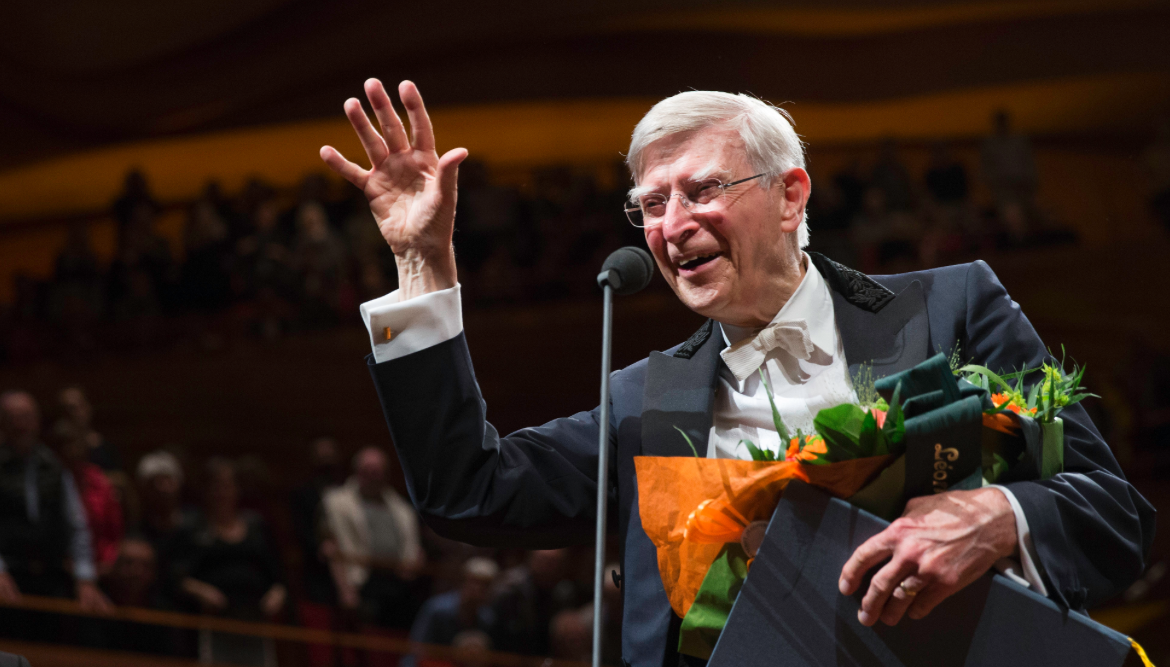Léonie Sonning Prize 2009
The conductor and pianist Daniel Barenboim received the Léonie Sonning Music Prize of 600,000 Danish Kroner at a concert at the DR Concert Hall on Sunday 19 April 2009.
The prize was presented by Michael Schønwandt, a member of the Léonie Sonning Music Foundation’s board. Included in his speech was the following tribute:
‘Your complete mastery of music, and your need to communicate it as widely as possible, has made you one of the greatest conductors of our time whether in front of the finest orchestras or in the greatest opera houses. Your mental capacity is unique. More importantly, so is your ability to communicate to us, your audience. It is this that makes your performances essential. But of equally fundamental importance is your deep commitment to the struggle for a solution to the Israeli-Palestinian conflict. You, who are a citizen of several countries – including both those mentioned – use music alone to mediate. The West-Eastern Divan Orchestra, which unites musicians from Israel and Palestine, is a brilliant example to the whole world of what music can and must do for all of us.’
citation
The 2009 Léonie Sonning Music Prize, and 600,000 Danish kroner, is awarded to Daniel Barenboim in recognition of his work for classical music. Across more than half a century, Barenboim has revitalized the treasury of classical music and, through his titanic creative power, has extended its reach through the world while acting as a guiding star for future generations. His courageous efforts to further music as a common language have allowed him to build bridges between people regardless of race, culture and religion.
In his speech of thanks, Barenboim addressed the Royal Danish Orchestra in particular:
‘This orchestra is actually to blame for me becoming a conductor. Because, when I first came to Europe from Argentina as a boy of about 10 years old, one of the first orchestras I heard was the Royal Danish Orchestra with the pianist Edwin Fischer as soloist. The older audience members will remember what a wonderful musician he was, and what a close relationship he had with this orchestra and your King, for whom ruling your country was not enough – he had to feel the power of being a conductor. Or maybe it was the powerlessness of being a conductor that made him want to be King. We will never know! Anyway, the concert I heard with this orchestra in the early 1950s with Edwin Fischer made me want to play and conduct Mozart’s concertos. And I said to Edwin Fischer: this is what I want. I want to play Mozart’s concertos and conduct from the piano, like you do. And his answer was very important – and something that some of my pianist colleagues have unfortunately not been told: if you want to conduct from the piano, you have to learn to conduct.’
programme
Carl Nielsen Symphony No 2, The Four Temperaments
Beethoven Piano Concerto No 3
Beethoven Piano Concerto No 5
Chopin Nocturne in D flat major (encore)
Participants:
The Royal Danish Orchestra
Michael Schønwandt, conductor
Daniel Barenboim in Denmark
When Daniel Barenboim received the music prize, he could look back over 40 years of performances in Denmark. In 1968 he gave his first concert in Copenhagen as conductor of the English Chamber Orchestra, which was followed by chamber music concerts with among others, his late wife Jacqueline du Pré, as well as conducting appearances with the Danish National Symphony Orchestra. He has conducted the West-Eastern Divan Orchestra at the Tivoli Concert Hall and given several piano recitals at the DR Concert Hall.
The daily press wrote, among other things:
Barenboim played like a feline, sneaking in on fast antelopes with controlled power and elegance in every gesture, suddenly utilizing overwhelming force in the violent climax of the hunt. The small, white-haired man has a breathtaking touch and a technique that allows him to caress the keyboard as if its notes were soft clay. At the award concert, he delivered extraordinary musical moments, with a range of colours in Beethoven’s piano concertos that one would not have thought possible to glean from a Steinway concert grand. […] In the Emperor Concerto, he unfurled the music’s fluttering poetry, combining exceptional delicacy with clarity. In the midst of all the fervor, he roared again and again with virtuoso pianism that cascaded out over the orchestra.
(Henrik Friis, Politiken, 21 April 2009)





